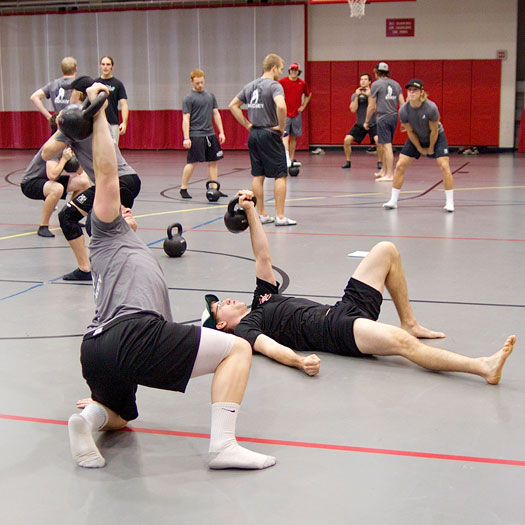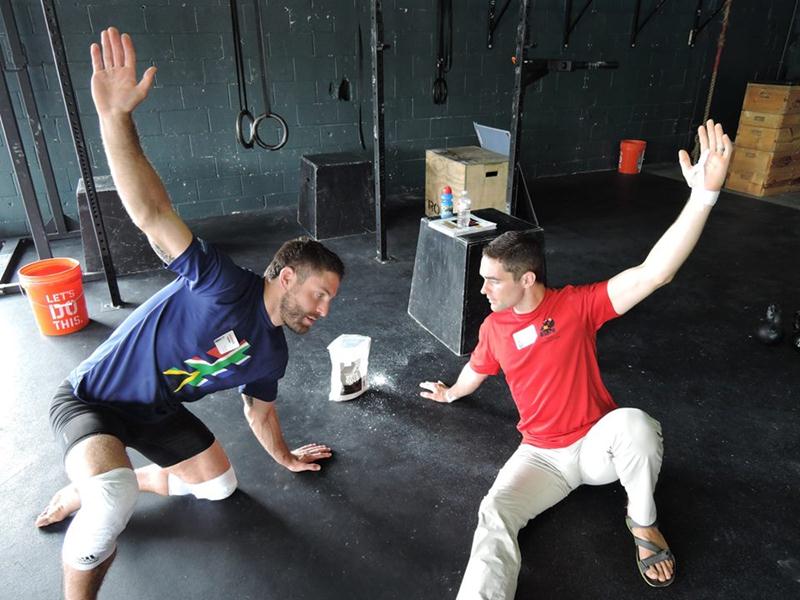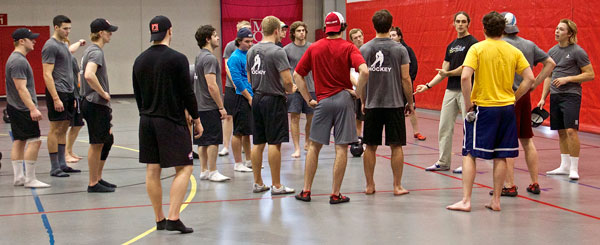An Interview with RKC Team Leader Nick Lynch
by Adrienne Harvey, SrPCC, RKC-II, CK-FMS, Primal Move Nat'l Instructor
Dragon Door: How did you get started with kettlebells?
Nick Lynch: My kettlebell training began because of my own injuries. I also noticed that many people who came to my studio had numerous existing injuries. Many athletes in the US train with Olympic lifting—which is really its own sport. When full time athletes add a new sport to their training, it can cause a lot of wear and tear issues. Many people were coming to me with these issues, and I was experiencing them myself.
At first, I didn’t know how to address the issues, since the only sport-specific training I knew was Olympic lifting. When I started looking for information about corrective exercises, the same names and systems kept popping up. About six years ago, I started trying some of these methods and they started to work for me—and my clients. My next step was
Enter the Kettlebell.
Dragon Door: What sports were you playing?
Nick Lynch: I’ve had a lifetime of contact sports, although semi-professional hockey was the main sport I played after high school. I grew up in Vermont and did a lot of back country skiing (including moguls and jumping off of cliffs),
lacrosse, boxing—I played nearly every sport that beats you up except for football! In the process, I developed several bulging discs and cracked vertebrae. I had to seek a path that would support my lifestyle—which led to strength training with kettlebells and bodyweight training.
Dragon Door: What changes did you experience after you started training with kettlebells?
Nick Lynch: The bulging discs and cracked vertebra in my lower back had caused sway-back posture, so my hips were tilted all the way forward, and my thoracic spine was also extremely hunched forward. But almost immediately, the flexibility and mobility though my thoracic spine and shoulders started to improve. I remember reading that if you can't lock your arms out overhead, then you're just a muscle-bound idiot, and I found that really offensive because I couldn’t do it! Finally, with enough arm bars, hanging from pull-up bars, and Turkish get-ups, my arms started to straighten out, my posture improved, and I developed all the muscles we can’t see in the mirror.
Dragon Door: How long have you been a fitness instructor, and what training methods were you using before kettlebells?
Nick Lynch: I’ve been training others for thirteen years. At age 15, my trainer was a natural bodybuilder who introduced me to the training world. Even now I still think back to many of his lessons. He was a really smart guy, and really big on pull-ups,
pistol squats, and barbell training. We were always doing things like wrapping a towel around a barbell before a deadlift to make it thicker. He was great and didn’t allow me to use belts, specialized equipment or supplements.
I started out with the "dinosaur" lifting techniques—deadlifts, squats, and overhead presses. It was a great experience. But my training got complicated when I started playing sports. While the strength and conditioning coaches did their best with what they were taught to do, we trained with high impact lifts. I don’t think our technique was where it needed to be, because many of us were getting hurt during strength training. But my real start in strength training was with those old "dinosaur training" methods.
Dragon Door: In addition to running a gym, you’re also a strength coach at the Milwaukee School of Engineering?
Nick Lynch: Yes. I primarily work with the hockey team and rowing team, but also work with the other teams' head coaches, team captains and top athletes. I help the coaches with programming and technique troubleshooting. I am also responsible for running the strength and conditioning programs for the hockey team and rowing team for their seasons and during the off-season. It’s interesting because most of the athletes are at least somewhat familiar with
kettlebells, but have never worked with an RKC or girevik Master of Sport.
The RKC is kind of mystical in their eyes, and they’re shocked when I first tell them to kick off their shoes to learn pistol squats and
one-arm push-ups! They usually expect to do bench presses and barbell snatches. But, they enjoy the more primal methods of training. We also added the snatch test and single limb training to our fitness testing. Our "single limb law" requires that everyone do single arm push-ups, single leg squats, and a partial one-arm chin-up, or at minimum a one-arm flex hang. This approach makes them think, "Why can I lift 450 pounds, but can't do a pistol squat?" It has helped them on a philosophical and physical standpoint.
Dragon Door: What are your favorite kettlebell movements for hockey and rowing?
Nick Lynch: Definitely get-ups and swings—those two are the cure-all for almost everything. I also really like the push-press, because they allow for a few extra reps past fatigue, which helps with lung capacity. The athletes have to breathe deeply and use that air to push the kettlebells overhead. Lastly, the front squat can tell us a lot about an athlete’s core strength.

Dragon Door: What results are the athletes getting from your training?
Nick Lynch: A lot less injury! While we still use barbells for heavy front squats or
deadlifts in the off-season, during the season, kettlebells are perfect for hip speed and mobility. We have even had guys who were scheduled for hip surgery not need it by the end of the season—and they had played through that season! Some of our athletes coming back fresh from knee surgery have cut their rehab time almost in half.
Most importantly, learning exercises like a kettlebell swing or a get-up requires that they learn a series of corrective exercises along the way. I think the body awareness and understanding the athletes gain from these corrective exercises is incredibly valuable.
Dragon Door: How did you decide to go to an RKC workshop?
Nick Lynch: It's kind of funny, I got into kettlebells by watching and reading up on Steve Maxwell. Here is a man in his 50’s, barefoot and showcasing humble feats of strength I could only dream of at the time. I thought his methods were strange but one must be strange to be healthy in this world. This led me to Pavel who talked about tight hips and shoulders, locking out joints and squatting below parallel.
All the information looked good and made sense, so I decided to try the basic program from
Enter the Kettlebell that consisted of alternating swings and get-ups with running laps. After a couple of months, I felt really strong. In ETK, there was a lot of talk about the RKC, so I decided to hire an instructor to check my form and get learn more about the certification. I was blown away by how much I needed to refine my technique. The next step was
registering for the RKC and hoping to pass! Kettlebells just felt right—they’re very primitive and simple. You grip the handle of a Dragon Door kettlebell and feel the power almost instantly.
I like how the RKC workshops are physical events—you can’t just sit and read a book then pass a test. Most fitness certifications you could pass by sitting at home while eating junk food and playing video games. But the RKC is legit, you have to know what you're talking about, and prove it with proper technique. I went to the 2012 RKC in St. Paul. Pavel led that one, and Prentiss Rhodes was my Team Leader. I really clicked with Prentiss and Jeff O’Conner because they were both very peaceful and calm. They had an almost spiritual approach to strength training and talked about visualization and breathing techniques. I was hooked! I notice that there are a lot of people in the
RKC organization now who also have that humble and calm approach.
The recent RKC in Chicago with
Andrea Du Cane was great—the information was tight, and everyone had an open mind and open heart. It was a great learning atmosphere, and I loved it!
Dragon Door: How would you define an optimal coach?
Nick Lynch: Trust is the number one word that sums up a good coach. This is fresh in my mind, because I just finished writing a blog post on this important subject. A good coach has earned respect as a result of their methods both on and off the field of action.
A great coach recognizes their athletes as regular people outside their sport—they must function in the real world, which makes up the bulk of the day. If your athletes are tough in sport and life, they’ll function better during training and competition.
A great coach will teach their athletes how to remain calm, cool, and collected in life’s toughest situations. When your athletes or students can come to you with a question or concern and not feel intimidated to do so, you’ve done a good job! This means you’ve earned their respect and trust! With a little respect and trust, your athletes and students will follow you until the end even if that means 10 minutes of
24kg snatches without chalk or air conditioning!
Dragon Door: What is your favorite kettlebell movement to coach or teach?
Nick Lynch: For me, kettlebell cleans are the toughest to teach, so I enjoy teaching them the most. That may sound nuts, but as an RKC I believe we strive to fix things, which has helped evolve our system to where it is today!
I think the Turkish get-up takes the cake as the best drill for understand one’s own mobility and strength. The TGU is so effective from a neurological standpoint, that I think if I were trapped on a deserted island with one 24kg I could build up enough strength to swim back to civilization. The TGU shows us exactly what we need to improve. Once you can perform the TGU with a shoe or glass of water, enter the kettlebell and get creative with programming and variations. The possibilities are endless!

Dragon Door: What are your next big goals?
Nick Lynch: I just registered for the Milwaukee
PCC in November. I’m very excited about it because I’ve been watching the Kavadlo brothers for a while, and they seem like really nice, humble guys. I’ve been into bodyweight exercises even before kettlebells and
Naked Warrior has been a favorite book of mine for a long time. I am very excited about spending three days breaking down pull-ups, squats and all that stuff.
Also, in October I’m going to the
RKC-II in Dallas to refine my kettlebell skills. I’m excited about the first ever RKC workshop in Milwaukee coming in May. Milwaukee is a great city where it is easy to get around, and affordable. I think people will enjoy it here, the airport is three miles from the studio, and healthy restaurants and food stores are also nearby. It will be a very relaxing atmosphere, so participants can save their energy for the workshop.

Dragon Door: What makes you unique as a coach?
Nick Lynch: Dealing with my own injuries has taught me empathy and compassion. I think everyone who trains hard and develops copious amounts of strength should learn empathy and compassion. Many people are very afraid of taking care of their health, because there's a lot of intimidation out there. When someone comes to you for help and you can offer compassion and empathy, then they’ll feel comfortable. Flexing and screaming, or belittling someone who has asked a question doesn’t gain anyone’s trust or respect. I've been humbled by my own injuries, and that’s calmed me down. If you've ever been in pain, or been close to someone in pain, then it is easier to help someone who has back problems from their desk job. I think we should all work on those two traits of compassion and empathy.
I really feel like the RKC has the opportunity to be a collection of strong, peaceful warriors who can teach other people how to feel better, get strong and more mobile. I love the message we can share.
Back